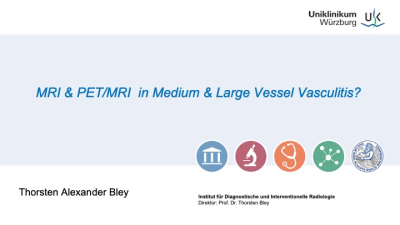Weekday Course
Cardiac & Vascular Inflammation
ISMRM & ISMRT Annual Meeting & Exhibition • 03-08 June 2023 • Toronto, ON, Canada

| Vessels on Fire | |||
| 15:45 |
 |
How Are MRI & PET/MRI Used in the Diagnosis & Management of
Medium & Large Vessel Vasculitis?
Thorsten Bley
Keywords: Cardiovascular: Vascular, Cross-organ: Inflammation Next to CCDS, MRI and PET are recommended imaging modalities in large vessel vasculitides. With an in-plane spatial resolution of 200x250µm2 MRI displays mural inflammatory changes (circumferential thickening, contrast enhancement) of the superficial temporal arteries in giant cell arteritis. Combined with a first pass angiography of the thoracic aorta and its branch vessels the inflammatory disease burden and vascular damage (dilatation, stenosis) can be assessed within one examination. PET is considered the most sensitive imaging modality for assessing large vessel vasculitis. Combining sensitivity of PET with anatomic information of MRI in one hybrid scan offers promising perspectives for vasculitis imaging. |
|
| 16:15 |
New Techniques for Quantitative Assessment of Vessel Wall
Inflammation
Chun Yuan
Keywords: Image acquisition: Quantification, Cardiovascular: Atherosclerosis, Cross-organ: Inflammation Inflammation's role in vascular disease development necessitates its detection and quantification for diagnosis and risk assessment. MRI contrast agents have aided in identifying vessel wall inflammation, from atherosclerosis to vasculitis. Challenges persist in quantitatively assessing inflammation due to vascular bed differences, spatial resolution, acquisition limitations, and contrast agent properties. Recent technical advancements address these challenges, such as linking dynamic contrast enhancement to plaque inflammation, improved DCE analysis, diverse contrast media applications, and image analysis tools integrating anatomical and vascular inflammation assessments. These advancements hold clinical significance and promise for future progress in managing vascular disease. |
||
| Heart on Fire | |||
| 16:45 |
Role of Cardiac MR in Assessment of Myocardial Inflammation
Kate Hanneman
Keywords: Cardiovascular: Cardiac Role of cardiac MRI in inflammation |
||
| 17:15 | New Techniques for Quantitative Assessment of Myocardial Inflammation Claudia Prieto | ||
The International Society for Magnetic Resonance in Medicine is accredited by the Accreditation Council for Continuing Medical Education to provide continuing medical education for physicians.